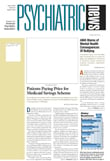People visiting thousands of screening sites on this year’s National Depression Screening Day (NDSD) will for the first time receive screening for generalized anxiety disorder and PTSD, in addition to mood disorders, such as depression and bipolar disorder.
The new and improved screening form incorporates elements of four different diagnostic tools, including the Harvard Department of Psychiatry/National Depression Screening Day Depression Test, Mood Disorder Questionnaire, Carroll-Davidson Generalized Anxiety Disorder Screen, and SPRINT-4 questionnaire for PTSD, which was created specifically for NDSD by Jonathan Davidson, M.D.
The screening will take place on October 10, just a month after the one-year anniversary of the September 11 terrorist attacks in New York City and Washington, D.C., and the related plane crash in Pennsylvania.
Each year since 1991, Screening for Mental Health Inc., a nonprofit agency based in Massachusetts, has organized NDSD. The event, which is held at nearly 6,000 screening sites throughout the United States and Canada, aims to help those with mood and anxiety disorders find treatment, educate the public about those disorders, and combat the stigma of mental illness. Last year about 100,000 people received screening for mood disorders. A similar number of people are expected to attend screenings this year.
“We wanted to create one simple screening form that effectively screens for a range of commonly underdiagnosed disorders and reflects current psychiatric understanding that these illnesses and symptoms frequently occur concurrently,” Douglas Jacobs, M.D., founder and executive director of NDSD and Screening for Mental Health Inc., told Psychiatric News.
“We wanted to create a mechanism that would allow the screening clinician to get a fuller picture of the person’s symptomatology, which will lead to earlier identification, and hopefully better treatment,” he said.
Jacobs said he believes that the timing of this year’s NDSD is “fortuitous,” because “it is a perfect opportunity for people still struggling with the events of 9/11 and the economic upheaval of the past year to seek help in a nonthreatening format.”
He added that many people with no psychiatric history who were affected by the attacks either directly or indirectly may be experiencing symptoms that they don’t understand or are embarrassed to discuss. “We hope that NDSD is able to connect them with their local treatment services.”
As NDSD has incorporated screening for different disorders into its annual event, it is also accounting for the specific needs of its diverse participants.
For instance, in 1999 NDSD spotlighted the mental health needs of high school students with the creation of the Signs of Suicide (SOS) High School Suicide Prevention Program.
In addition to screening tools, the SOS program includes educational materials for teaching teens to recognize the warning signs of depression and suicide in their peers and to alert a responsible adult about the problem. The materials include a video about teen depression and suicide and a discussion guide to help students better understand the video. A grant from Ronald McDonald House brought the program to 1,000 high schools last year, and that number is expected to double this year.
Elderly people who come in for screening have the option of completing screening forms printed in large type and receive brochures about mood and anxiety disorders in geriatric populations.
NDSD also includes a Spanish-language kit for screening sites that primarily serve Latino populations.
Patients visiting some primary care physicians and nonpsychiatric specialists will also receive screening for depression and related disorders. Since 1998 primary care doctors have been included in NDSD in hopes that they will incorporate the screening into their everyday practices.
“The U.S. Preventative Services Task Force recently recommended that primary care physicians screen all adult patients for depression,” said Jacobs. “We hope that this recommendation will motivate our primary care colleagues to screen and refer patients with complicated, comorbid, or severe psychiatric disorders.”
Jacobs explained that an important companion piece to the screening form is a reference guide to assist primary care clinicians in screening, diagnosing, and initiating treatment for clinical depression.
Those interested in providing screening on National Depression Screening Day must first register by downloading a form at the Web site www.mentalhealthscreening.org/ndsd/psychnews or by calling NDSD at (718) 239-0071. Registration fees are $150 for most private sites, $50 for sites in the public sector, and free for primary care screening sites. Fees include the cost of materials for setting up a site. ▪
